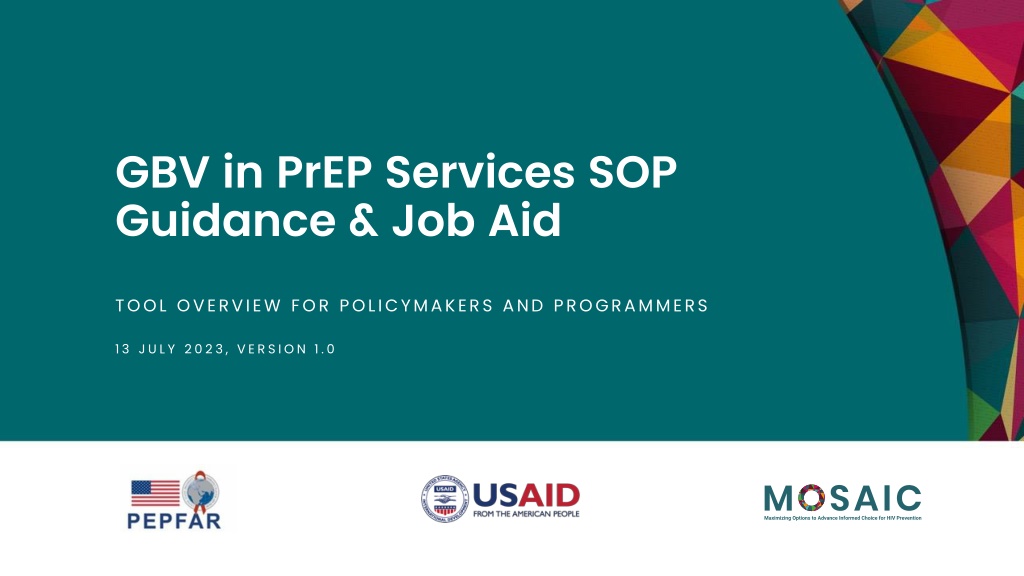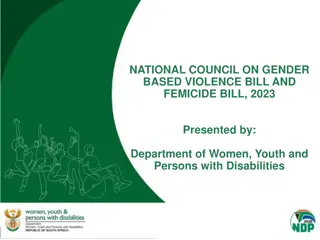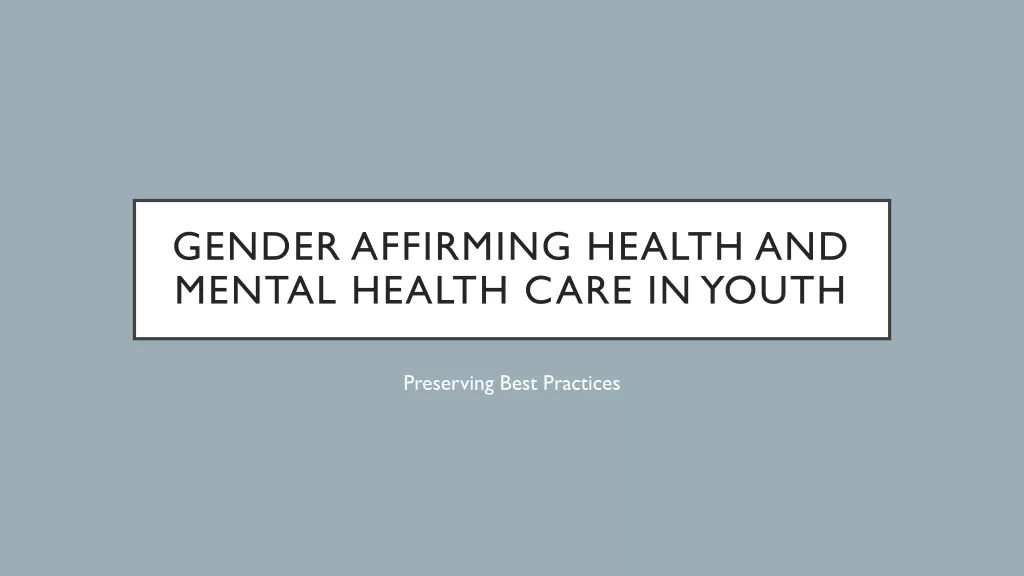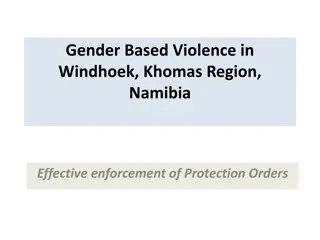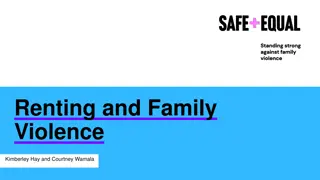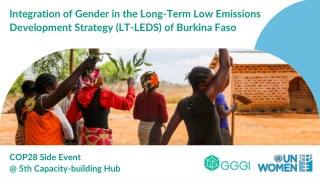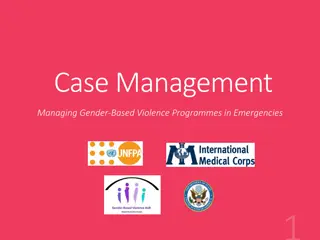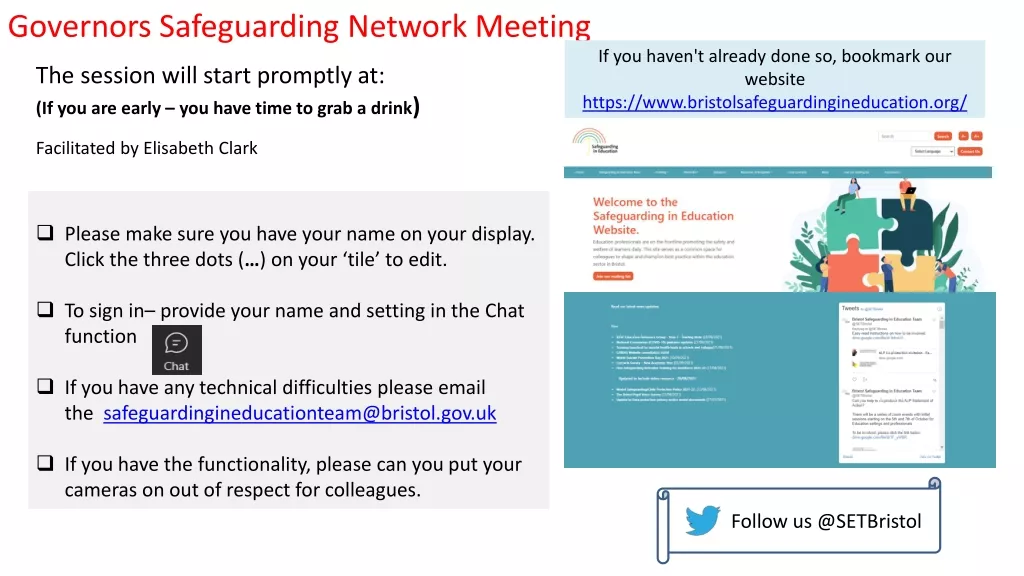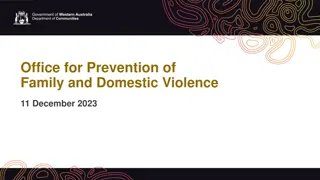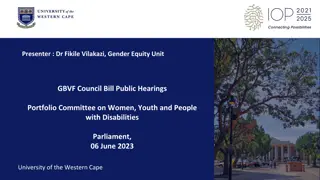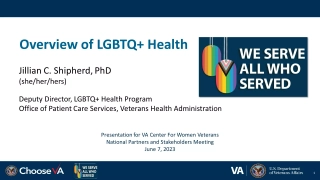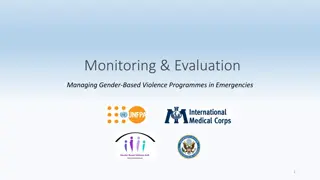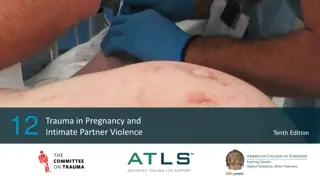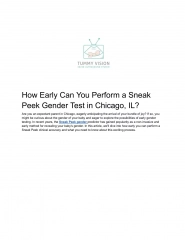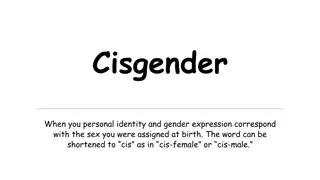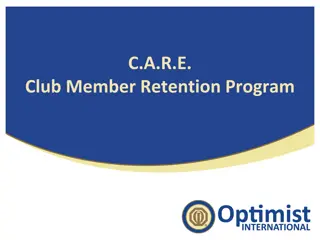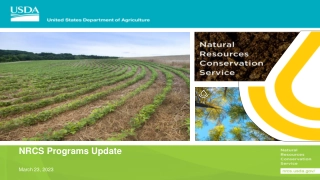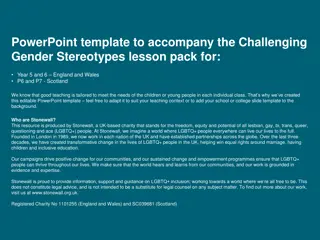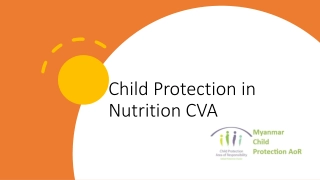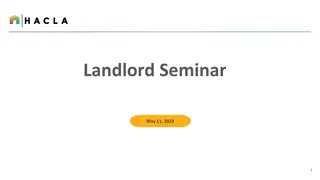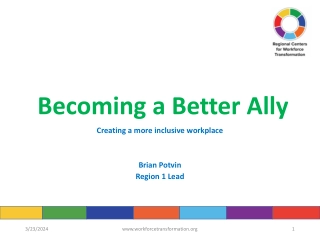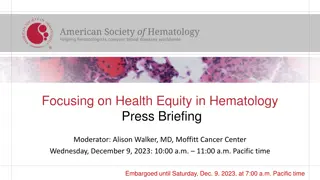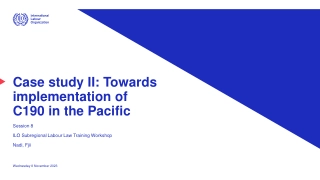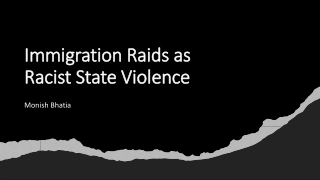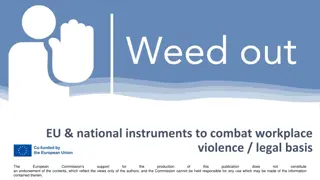Addressing Gender-Based Violence in PrEP Programs
Gender-based violence (GBV) and intimate partner violence (IPV) pose significant barriers to effective HIV prevention, including PrEP services. This overview highlights the importance of routine inquiry for GBV in PrEP programs to enhance PrEP uptake and adherence, especially among vulnerable populations. The SOP Guidance and Job Aid presented here outline essential steps for providers to address GBV within PrEP services, emphasizing the critical link between violence and HIV acquisition.
Addressing Gender-Based Violence in PrEP Programs
PowerPoint presentation about 'Addressing Gender-Based Violence in PrEP Programs'. This presentation describes the topic on Gender-based violence (GBV) and intimate partner violence (IPV) pose significant barriers to effective HIV prevention, including PrEP services. This overview highlights the importance of routine inquiry for GBV in PrEP programs to enhance PrEP uptake and adherence, especially among vulnerable populations. The SOP Guidance and Job Aid presented here outline essential steps for providers to address GBV within PrEP services, emphasizing the critical link between violence and HIV acquisition.. Download this presentation absolutely free.
Presentation Transcript
GBV in PrEP Services SOP Guidance & Job Aid TOOL OVERVIEW FOR POLICYMAKERS AND PROGRAMMERS 1 3 J U L Y 2 0 2 3 , V E R S I O N 1 . 0
Outline Why ask about gender-based violence in PrEP programs? SOP Guidance & Job Aid overview SOP Guidance contents Highlight: GBV routine inquiry in PrEP services Highlight: counseling messages
Experiences of gender-based violence (GBV) or intimate partner violence (IPV) are associated with an increased likelihood of HIV acquisition. GBV is also a barrier to accessing HIV services, including PrEP services. IPV is associated with lower PrEP uptake and adherence and increased PrEP interruption. PEPFAR requires that PrEP service providers conduct routine inquiry with all PrEP clients to improve effective use of PrEP, especially among adolescent girls, young women, and members of key populations affected by HIV. In the context of PrEP services, routine inquiry for GBV focuses on prevention of and response to physical and sexual IPV and non- partner sexual violence (NPSV) because of their clear link to HIV acquisition.
A protocol/standard operating procedure for asking about violence A standard set of questions where providers can document responses The World Health Organization has outlined minimum requirements that must be met before providers can ask about gender-based violence Providers who are trained to ask about GBV Providers who are trained to provide first- line support for violence (or beyond) A private, confidential setting A referral or service linkage process The GBV in PrEP Services SOP Guidance and Job Aid help PrEP programs meet these minimum requirements. WHO Clinical and Policy Guidelines for Responding to Intimate Partner Violence and Sexual Violence Against Women
Types, consequences, and patterns of gender- based violence Links between inequitable gender norms, power dynamics, and violence In addition to training on asking about violence and providing first-line support, PrEP service providers should also complete gender- sensitive training. Relationship between gender-based violence and PrEP initiation and continuation Needs of clients when they experience violence and barriers to accessing violence response services This slide deck and the GBV in PrEP Servies SOP Guidance and Job Aid do not constitute sufficient training in gender and gender-based violence. Opportunities to critically reflect on one s beliefs, assumptions, potential biases, and emotional responses that affect interactions with PrEP clients and with clients who have experienced violence
1 SOP GUIDANCE & JOB AID OVERVIEW
GBV in PrEP Services SOP Guidance & Job Aid: Tool overview These resources support the development and implementation of standard operating procedures (SOP) for asking about and responding to gender-based violence (GBV) as part of PrEP service provision according to the WHO minimum requirements First developed for oral PrEP services in 2020. Updated in 2023 to include the PrEP ring and CAB PrEP, as well as considerations for other forms of GBV. These tools are evidence-informed: based on findings from randomized controlled trials and previously evaluated SOPs.
What are the GBV in PrEP Services SOP Guidance & Job Aid? The guidance document includes recommendations for training, response & referral, counseling on PrEP disclosure or discreet use, and staff support The job aid is an adaptable tool to support providers as they ask about and respond to GBV, and in counseling clients about safe PrEP disclosure or discreet use PrEPWatch: GBV in PrEP Services SOP Guidance PrEPWatch: GBV in PrEP Services Job Aid
2 SOP GUIDANCE CONTENTS
CONTENTS SOP Guidance: GBV in PrEP Services Background & Introduction Procedures Appendices SOP Development & Preparation GBV Routine Inquiry Questions for Key Populations Acronyms & definitions GBV Routine Inquiry Background Steps for Establishing and Maintaining a Referral Network Provision of First-Line Support Purpose Standard Operating Procedure Template PrEP Counseling Scope Staff Experiences of Burnout, Compassion Fatigue, and Vicarious Trauma Referral Network Template Responsibilities Referral Letter Template Documentation Adapted Procedures for COVID-19
Background & Introduction SOP Guidance: GBV in PrEP Services This SOP Guidance is intended to help PrEP sites effectively identify and support clients who experience GBV and to support providers as they help PrEP users navigate PrEP disclosure or discreet PrEP use in their relationships. Key responsibilities for providers, programmers, and other site staff, as well as what this guidance does and does not cover, is outlined in the Background & Introduction.
Procedures SOP Guidance: GBV in PrEP Services The Procedures section outlines the bulk of what is needed to develop & implement an SOP to address GBV identification & response in PrEP services, including recommendations for: Understanding the local legal context Developing a referral network Training staff including any staff who may interact with clients Outlining the limits of confidentiality and conducting routine inquiry Providing first-line support using the LIVES approach Referral procedures Processes to handle spontaneous disclosures of violence PrEP counseling, including information sharing on method-specific issues, choice considerations for clients who are concerned about violence, and detailed suggestions for method-specific PrEP disclosure or discreet PrEP use Preventing burnout, compassion fatigue, and vicarious trauma among staff Documenting GBV cases and provision of support and referral Considerations for this work in the context of COVID-19 or other public health crises or natural disasters
Appendices SOP Guidance: GBV in PrEP Services The Appendices contain adaptable tools to develop & implement an SOP for addressing GBV in PrEP services and meet the WHO minimum requirements for asking about GBV.
3 HIGHLIGHT: GBV ROUTINE INQUIRY IN PREP SERVICES
Routine inquiry should occur for all clients who are considering or currently using PrEP. GBV routine inquiry in PrEP services Routine inquiry should be done at every visit client circumstances and relationships change! BEFORE beginning: Explain limitations on confidentiality, such as mandatory reporting requirements Explain that all PrEP clients are asked about violence to provide the best possible service
Has your partner ever (or since your last visit, for returning clients) made you feel afraid, bullied or insulted you, threatened to hurt you, or tried to control you (for example, not letting you go out of the house)? Standard questions for asking about violence Has your partner ever hit, kicked, slapped, or otherwise physically hurt you? Has your partner, or someone else, ever forced you into sex or forced you to have any sexual contact you did not want? These questions are adapted from PEPFAR guidance. Recommended questions for key populations members are included in Appendix A.
Never pressure a client to disclose violence, even if you think it may be happening. Focus on reassuring the client that help is available, should they need it. No service should ever be denied to a client because they did or did not disclose violence. Always offer to screen for PrEP, unless the client should consider post-exposure prophylaxis (PEP). Routine inquiry considerations Any client who reports sexual violence should be linked as soon as possible to critical clinical and counseling services, including: PEP, if within 72 hours Emergency contraception, if within 120 hours/5 days Clients who use PEP will likely benefit from PrEP after completing the 28-day course. PEP use is considered a potential gateway for PrEP initiation.
Routine inquiry in the Job Aid
4 HIGHLIGHT: COUNSELING MESSAGES
Counseling messaging Opening the conversation Say: You decide whether to tell your partner about PrEP. Many PrEP users want their partner to know so they can be supportive. Other users, with privacy, safety, or other concerns, do not want partners to know. Many people can successfully use PrEP without their partner s knowledge. I would like to hear from you about whether you want to discuss your PrEP use with your partner(s). Beginning counseling Continued engagement Provide first-line support for clients who disclose violence Provide initial choice counseling on available PrEP methods Administer GBV routine inquiry questions Discuss client concerns about using their chosen method safely Discuss whether to tell partner(s) about PrEP use Decide whether to tell partner(s) about PrEP use Ask: How would your partner(s) respond if they knew you were using PrEP? Are you afraid that your partner(s) would have a negative or violent reaction if they knew you were using PrEP? If the client is afraid of a negative response, ask why. Probe for client concerns about abusive behavior by the partner and allow them to reflect on how their partner may respond differently to different PrEP methods.
Counseling messaging For clients who disclose violence When a client discloses violence, provide first-line support before proceeding. Say: People in abusive and controlling relationships or who experience violence may face challenges to preventing HIV. It may be difficult to negotiate condom use and to know your partner s status. This can make PrEP even more important. Listen: Closely, with empathy, and without judging Inquire: Assess and respond to needs or concerns Validate: Show understanding and believe the client; they are not to blame for GBV Enhance safety: Discuss a plan to protect from further harm; include PrEP in emergency bag Support: Offer to connect to additional information, services, and social support, including PEP or emergency contraception Say: Clients experiencing control/abuse may find it more difficult to use PrEP correctly and may need extra support. Let s brainstorm specific challenges that you may face and strategies to overcome these challenges. If referrals are accepted, offer active referral OR accompaniment to any desired services Then, work with the client to decide whether to tell their partner(s) about their PrEP use.
Counseling messaging Disclosure Tips for telling a partner about your PrEP use Use simple language Maintain eye contact Remain calm Bring information about PrEP & PrEP methods to help answer questions Tell your partner in a safe place. For example, where you can leave easily if needed Tell your partner at a time when they are able to focus and have time to discuss For clients who want to disclose Continued engagement Review tips for telling a partner Discuss additional tips for disclosing PrEP use Additional tips for disclosing PrEP use Before telling your partner you are using it, discuss PrEP or your PrEP method generally to see what they say Give a little bit of information at a time Only tell your partner what they need to know (for example, that you will be using a daily pill/monthly ring/injection to protect your health) If they are resistant at first, bring it up again over time to build support Say: I can help you brainstorm ways to tell your partner more safely, including having your partner speak to a staff person here. Offer to schedule an appointment with the client and their partner if they would like your help disclosing PrEP use.
Counseling messaging Discreet use Some strategies for discreet PrEP use: Store pills, rings, or other PrEP-related products in places where the partner will not look (handbag, keychain, with pads and tampons). Ask a neighbor to keep pills or rings. Note that this may make it more challenging to remember to take pills as prescribed. For clients who do not want to disclose Continued engagement Store extra PrEP supplies, such as additional pill bottles or PrEP rings in an unmarked container (ensure that this container is stored away from direct sunlight, ideally in a cool and dry place, to avoid damaging the medication). Think of a reason for regular clinic visits or coordinate PrEP visits with other necessary travel or clinic visits. Help the client brainstorm strategies to keep their PrEP use private. Discuss different strategies so that the client has at least 1-2 that they can use. Remind the client that using PrEP as prescribed is important, but not as important as their safety. If strategies for discreet PrEP use change their product choice, discuss other potential PrEP methods and HIV prevention strategies. Discuss discreet management of side effects or injection-site reactions they are experiencing or may experience from the PrEP method they have chosen. CAB PrEP users may choose to remove any injection site bandages prior to seeing their partner. For oral PrEP, take pills out of their container while the partner is away and place them somewhere less obvious. Tell the partner they are taking a new medication but don t disclose that it is for HIV prevention. If permitted by local guidelines, discuss the possibility of multi-month dispensing of oral PrEP or the PrEP ring. Brainstorm what to do if the partner discovers PrEP use and becomes angry. This may include getting an emergency supply of PrEP, choosing support people who can help in an emergency, or creating a safety plan. Ask the client what support the clinic can provide.
Counseling messaging Final counseling & decision making Closing the conversation Continued engagement Support the client to reflect on available PrEP methods and confirm the method they have chosen, choose a different method, or decline PrEP use. If the client wants to start or continue using PrEP, prescribe their chosen PrEP method. Help the client identify their main reason for using PrEP and remind the client of their strength and power. Work with the client to identify who else can support their PrEP use and what kind of support the client needs from the clinic. If, due to violence or other obstacle, the client is not able to use PrEP as prescribed or anticipates they will not be able to use PrEP as prescribed, discuss other effective HIV prevention strategies.
Counseling flow in the Job Aid
ACKNOWLEDGMENTS Morgan Garcia and Giuliana Morales, FHI 360 Miriam Hartmann and Elizabeth Montgomery, RTI International MOSAIC is made possible by the generous support of the American people through the U.S. President s Emergency Plan for AIDS Relief (PEPFAR) and the U.S. Agency for International Development (USAID) cooperative agreement 7200AA21CA00011. The contents of this presentation are the responsibility of MOSAIC and do not necessarily reflect the views of PEPFAR, USAID, or the U.S. Government. Photo Credit: MOSAIC Consortium; Getty Images
